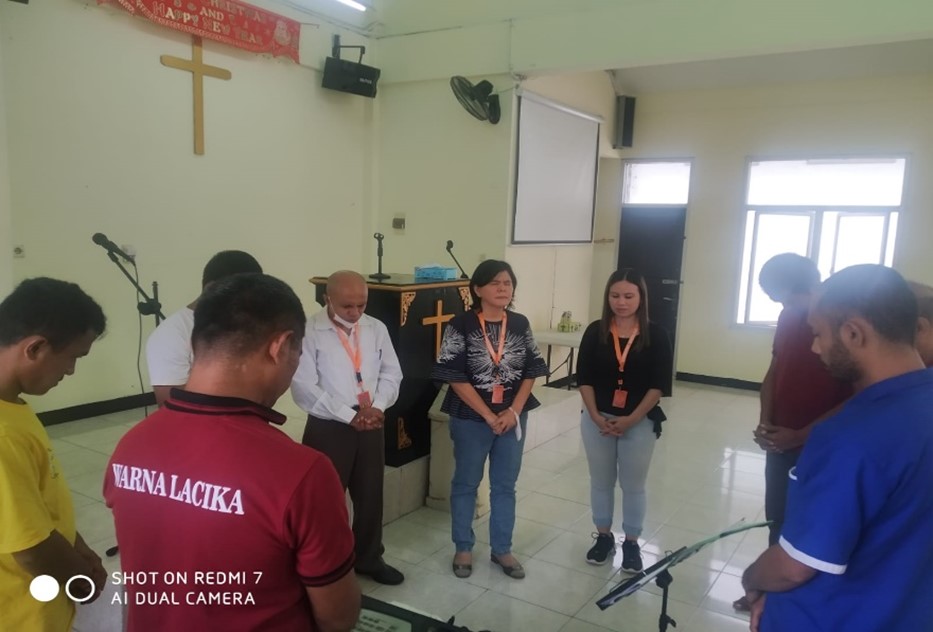PEMBINAAN MENTAL SPIRITUAL KRISTEN WARGA BINAAN DI LAPAS KELAS IIA CIKARANG
DOI:
https://doi.org/10.47457/jps.v4i1.357Keywords:
Christian, coaching, correctional Institution, mental, spiritualAbstract
This paper departs from the problem of the role of God's servant/church servant in fostering the spiritual mentality of God's congregation, in this case, the inmates of Lapas IIA Cikarang. The biggest fear of inmates while serving their sentence is being away from their families. Servants of God who devote themselves to fostering inmates should also equip themselves to serve the mental recovery of inmates. Spirituality impacts the good and bad of individual behaviour in interacting with God and others, influenced by the environment, experience and knowledge. New thoughts and enthusiasm and facing the realities and challenges of life more religiously. Dare to reject negative thoughts that tempt them to return to his dark life of committing crimes. Christian Spirituality Mentality also helps His congregation find wholeness and balance in their relationship with God, others, and nature. Encouraging motivation, solidarity, dialogue and cooperation in building a just, peaceful and dignified life. Mental Spiritual Guidance is an effort to improve and renew the actions and behaviour of inmates through mental guidance of their souls and spirituality so that they become inmates who have a solid spiritual faith and healthy personality, reflect the character of Christ and are responsible for living their lives while in prison, furthermore, later, after being free and returning to society.
Downloads
References
Adiansyah, Adiansyah, and Sukihananto Sukihananto. 2017. “KEKERASAN FISIK DAN PSIKOLOGIS PADA NARAPIDANA LANSIA DI LEMBAGA PEMASYARAKATAN JAWA BARAT.” Jurnal Keperawatan Indonesia. https://doi.org/10.7454/jki.v20i3.623.
Baskoro, Paulus Kunto, and Yonatan Alex Arifianto. 2021. “Pentingnya Komunitas Sel Dalam Pertumbuhan Gereja: Sebuah Permodelan Dalam Kisah Para Rasul.” MAGNUM OPUS: Jurnal Teologi Dan Kepemimpinan Kristen. https://doi.org/10.52220/magnum.v2i2.87.
Collins, Garry R. 1989. “Konseling Kristen Yang Efektif. Malang: SAAT, 1989.” Konseling Kristen Yang Efektif.
David B. Perrin. 2007. “Studying Christian Spirituality.” Routledge - New York and London.
Dolince Edowai. 2018. “‘Pengaruh Ibadah Persekutuan Mahasiswa Papua ( IPMP ) Terhadap Pertumbuhan Rohani Mahasiswa Papua Di Kota Makassar,’ Jaffray : 185–196.187-188.”
Fee, Gordon D., and Douglas Stuart. 1989. Hermeneutik: Bagaimana Menafsirkan Firman Tuhan Dengan Tepat! Gandum Mas, Malang.
Gatsweiler, Karl, Der Paulinische Wunderbegriff. 2001. “Kebutuhan Gereja Saat Ini Kerajaan Allah Dan Kuasa-Nya.” GM Malang.
Gunawan, Widodo. 2018. “Pastoral Konseling: Deskripsi Umum Dan Praktik.” Sekolah Tinggi Teologia Abdiel 2, no. 1: 96.
Hartono, Handreas. 2018. “Membentuk Karakter Kristen Pada Anak Keluarga Kristen.” Kurios. Sekolah Tinggi Teologi Pelita Bangsa Jakarta. https://doi.org/10.30995/kur.v2i1.22.
Hevi Selvina. 2017. “No Title.” Peran Lembaga Pemasyarakatan Dalam Penanggulangan Kekerasan Yang Dilakukan Oleh Narapidana 2.
Julianto Simanjuntak. 2019. Seni Merayakan Hidup Yang Sulit. Gramedia.
Jusuf Nikolas Anamofa. 2013. “‘Tinjauan Buku Studying Christian Spirituality,’ UNIVIERA 2, No. 2: 144–151.145-146.”
Kawangian, Sherly Ester. 2015. “Prinsip Dasar Konseling Kristen.” Jurnal Ukrim Yogyakarta 6: 1–111.
Latif, Helen Farida. 2017. “Pengaruh Pengajaran Dan Persekutuan Terhadap Tingkat Pertumbuhan Rohani Anak Dan Remaja.” Epigraphe 1, no. 1: 119–38.
Rahmiati Tanudjaja. 2018. “Spiritualitas Kristen Dan Apologetika Kristen.” Literatur SAAT 1.
Riswan, and Fasmani Ndruru. 2022. “ARGUMENTASI TEOLOGIS TENTANG DAMPAK DOSA TERHADAP PIKIRAN.” Phronesis: Jurnal Teologi Dan Misi 5, no. 2: 152–65. https://doi.org/https://doi.org/10.47457/phr.v5i2.245.
Rubin Adi Abraham. 2021. “Diktat Konseling Kristen.” STT Kharisma, Bandung.
Setyaningrum, Yunias Lis. 2010. “Peranan Konseling Kristen Dalam Membimbing Anggota Jemaat Yang Terlibat Problema Okultisme.” Penabiblos 1, no. 2: 1-.
SIMON, MARK ANDREW. 2020. “Panggilan Misi.” SOLA GRATIA: Jurnal Teologi Biblika Dan Praktika 2, no. 1. https://doi.org/10.47596/solagratia.v2i1.83.
Sosiawan, Ulang Mangun. 2017. “, ‘Upaya Penanggulangan Kerusuhan Di Lembaga Pemasyarakatan,’ DE JURE 17, No. 3 : 365–379.371.”
Stevanus, Kalis. 2020. “Karya Kristus Sebagai Dasar Penginjilan Di Dunia Non-Kristen.” Fidei: Jurnal Teologi Sistematika Dan Praktika. https://doi.org/10.34081/fidei.v3i1.119.
Tompo, Hengki Bonifacius, David Kristanto, and Adri Prematura Wicaksono. 2021. “REVITALIZING WORSHIP IN THE POST-PANDEMIC CHURCH: TOWARDS A LITURGY OF THANKSGIVING.” Sekolah Tinggi Teologi Arastamar Bengkulu 7, no. 2: 685–705. https://doi.org/https://doi.org/10.38091/man_raf.v8i2.249.
Untung, Naftali, Rafael Oktovianus Tanonggi, and John Riwu Pekuwali. 2021. “Komsel Pemuridan Kreatif Pemuda Gbi Bukit Sion.” Jurnal PKM Setiadharma 2, no. 2: 91–99. https://doi.org/10.47457/jps.v2i2.179.
“UU RI No. 22 Tahun 2022 Tentang Pemasyarakatan.” n.d.
Warniyanti, S. 2017. “Pentingnya Layanan Konseling Berbasis Kesehatan Mental Di Lembaga Pemasyarakatan. SCHOULID: Indonesian Journal of School Counseling, 2(3), 31.”

Downloads
Published
How to Cite
Issue
Section
License
Copyright (c) 2023 Jurnal PKM Setiadharma

This work is licensed under a Creative Commons Attribution-ShareAlike 4.0 International License.
Authors who publish with this journal agree to the following terms:
- Authors retain copyright and grant the journal right of first publication with the work simultaneously licensed under a Creative Commons Attribution License that allows others to share the work with an acknowledgement of the work's authorship and initial publication in this journal.
- Authors are able to enter into separate, additional contractual arrangements for the non-exclusive distribution of the journal's published version of the work (e.g., post it to an institutional repository or publish it in a book), with an acknowledgement of its initial publication in this journal.
- Authors are permitted and encouraged to post their work online (e.g., in institutional repositories or on their website) prior to and during the submission process, as it can lead to productive exchanges, as well as earlier and greater citation of published work (See The Effect of Open Access).











